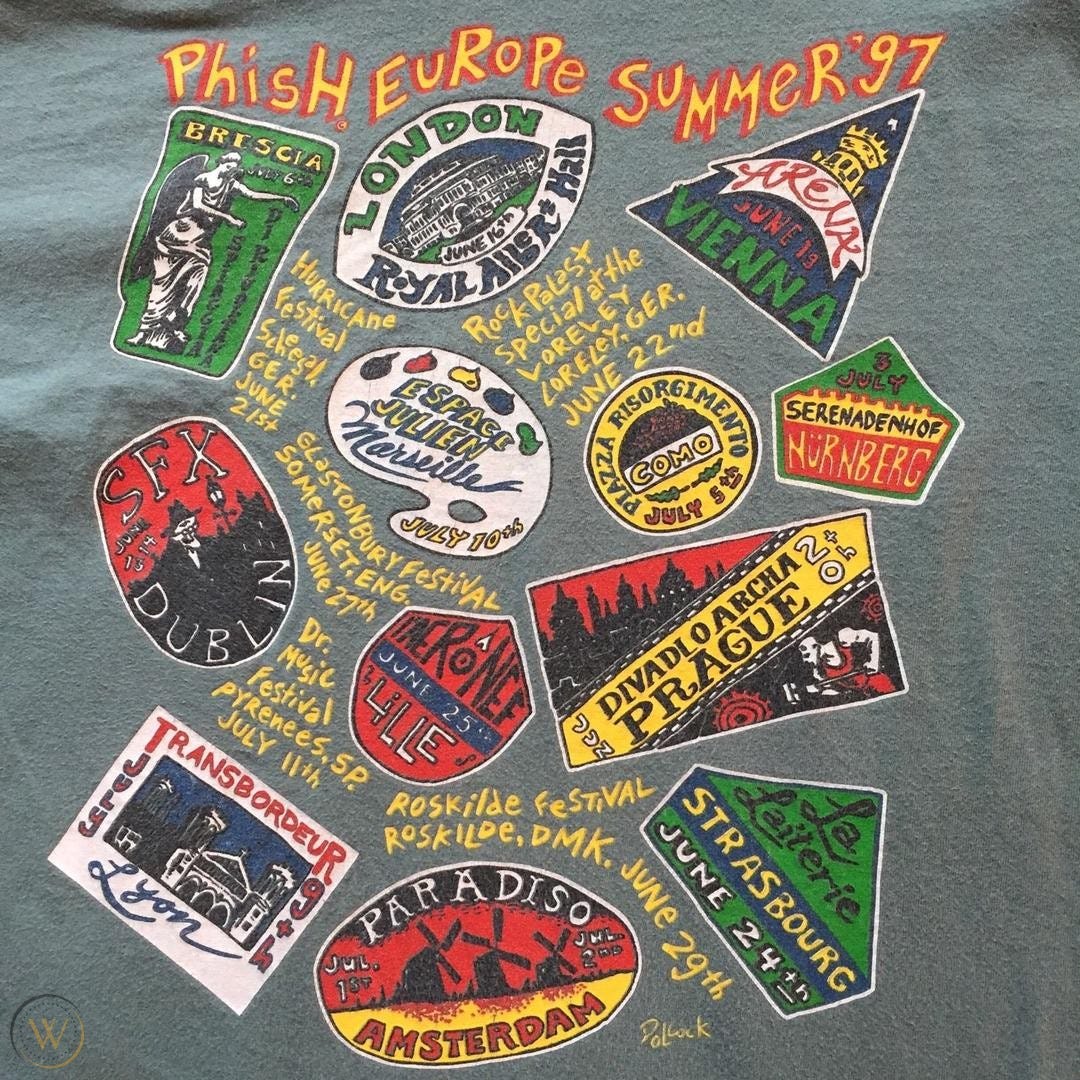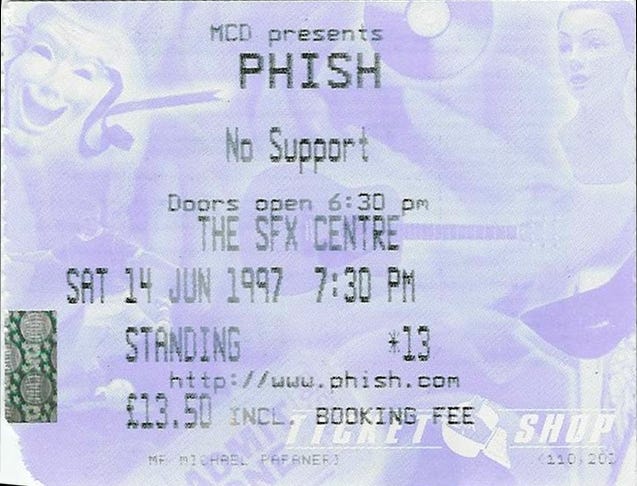SET 1: Down with Disease > NICU, Dirt, Talk, My Soul, Cars Trucks Buses, Limb By Limb, Bye Bye Foot, Free, Prince Caspian
SET 2: Twist, Piper, Saw It Again, Waking Up, Dogs Stole Things, Waste, David Bowie, Cavern
ENCORE: When the Circus Comes, Rocky Top
The second night in Dublin is a mellow one. Half of the debuts held back for night two are on the quieter side — Dirt, Bye Bye Foot, Waking Up — and they’re joined by similarly hushed “older” songs such as Talk, Waste, and When The Circus Comes. Phish, in builder mode, also waves off the no-repeats rule, bringing back Limb By Limb and Dogs Stole Things with a show gap of 1. The cowfunk dance party introduced on 6/13 almost misses the bus, only showing up (again, unexpectedly) in the set 2 closer.
It brings to mind a throwaway comment in my Bradstock essay, that if one were charting the trendline of Phish from 1995 to 1997 and trying to predict their next move, you’d reasonably assume they were headed in a quieter direction. Billy Breathes was certainly Phish’s most chill record to date, with tracks showing the influence of The White Album’s gentle psychedelia and smooth production from DMB collaborator Steve Lillywhite. The band also unveiled a new acoustic mini-set on the road, and appeared to scale back the high voltage that defined 1995’s biggest moments.
As I said on 6/6, the new material also sounded small, in part due to the band using their backup gear at Brad and Pete’s House. But there’s another confounding factor that continues into Europe. Nearly halfway into 1997, Phish hasn’t played a venue larger than a theater, with the Shepherd’s Bush Empire of London (capacity 2,000) the biggest room in 18 shows to date. The SFX Centre sounds impressive, but it only held roughly a thousand paying customers; the next show, in Royal Albert Hall, will be the largest non-festival venue until they return to American sheds in late July.
The last time Phish was on the theater circuit, in 1994, they seemed to relish testing the structural integrity of those older venues with an aggressive wall of sound, an arena-rock tiger trapped in an ornately-architectured cage. Three years later, they seem more amicable to playing down to the venue size, either out of a sense of tourist politeness or as part of their new focus on texture over pyrotechnics. The European shows of Winter 1997 and these first two outings in the summer installment sound as intimate as you’d expect from their settings.
That approach supports songs in their delicate infancy such as Dirt or Bye Bye Foot, and buttresses the balladry of songs like Caspian and Waste, both of which get majestic treatments tonight. But it also compresses other songs — the opening Disease fails to lift off after it bloomed into maturity in 1996 — and gives a false first impression of some of the new material’s potential.
The latter is exemplified by Twist and Piper, both making their public debuts at the start of a five-new-song run to lead off the second set. In six months' time, this same pairing would produce one of the most overwhelming sonic experiences of my life, a wave of noise that would flood the gargantuan dimensions of The Palace of Auburn Hills. But in Dublin they sound humble, simple four-chord progressions that produce, first, a light funk jam, and second, a brief experiment in quiet/loud dynamics. What would grow into two of Phish’s most reliable arena-sized bangers come off here as cozy, mid-tempo placeholders, far from the reliable face-melting shredfests of Antelope, Melt, or Mike’s.
Yet for more established songs, the theater vibes help Phish find new pathways to explore. Free is the archetypal Phish large-venue song, but here it gets an extended and very interesting middle jam that refuses to peak, instead coasting sideways with Page’s clavinet in the driver’s seat. Bowie, a song that struggled to find its footing in 1996 (logging only a single jam chart-worthy version), takes its time with a four-minute intro threading in a full-band Dave’s Energy Guide tease and a multitude of spacey sound effects. Even hoary old Cavern, as predictable a set closer as they come, takes a diversion into cowfunk akin to the famous version that would close out the Island Tour.
Still, you can see why these changes might have seemed like a step back, at first blush. Up through the Clifford Ball, the narrative of Phish had simply been about getting bigger and bigger, both in popularity and sound. Repeatedly traveling to Europe fit that storyline, as the next step in their global domination. But the band’s lower status abroad and their newfound desire to tinker meant they had to go back to go forward, and get smaller before they could roar back even more massive than before.




